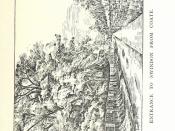In "Rear Window", the voyeurism is readily apparent even in the first few minutes of the film. As it is revealed, Jefferies is a photographer. A photographer is the essence of a voyeur, as in the course of the job it is routine to peer into the life of something, whether it is a plant, an animal, or a person. However, since Jefferies's boss refuses to let him go back to work, he applies his work to his home-life, using his binoculars to look in on the lives of his neighbors, making mental pictures where he used to make physical ones. It appears harmless at first, but soon devolves into a primal urge to see exactly what is going on in his neighbors' lives. "Scale, space, stories are all anothropomorphic. Here, curiosity and the wish to look intermingle with fascination with likeness and recognition: the human face, the human body, the relationship between the human form and its surroundings, the visible presence of the person in the world" stated from Mulvey's 'Visual and Other Pleasures'.
Jefferies enjoys watching the everyday habits of his neighbors. He takes great pleasure in watching Miss Torso dance around in her apartment, Mr. and Mrs. Thorwald bicker and argue, and the composer struggle with his music. Jefferies's gratification doesn't come from simply watching his neighbors, it comes from him not being seen. Instead of sitting in the open and risking discovery, he hides in the shadows. But instead of admitting he has a serious problem, he tries to rationalize it. He doesn't have anything better to do, and this is the most exciting form of entertainment at his disposal. Besides, it seems like it doesn't hurt anybody.
"At the extreme, it can become fixated into a perversion, producing obsessive voyeurs and Peeping Toms...


